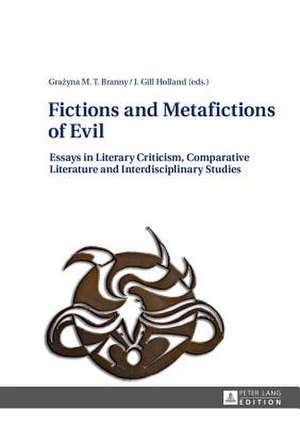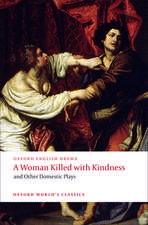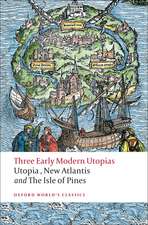Fictions and Metafictions of Evil
Editat de Grazyna M. T. Branny, J. Gill Hollanden Limba Engleză Hardback – 2 sep 2013
Preț: 517.04 lei
Preț vechi: 671.49 lei
-23% Nou
Puncte Express: 776
Preț estimativ în valută:
98.96€ • 101.98$ • 83.55£
98.96€ • 101.98$ • 83.55£
Carte tipărită la comandă
Livrare economică 03-17 martie
Preluare comenzi: 021 569.72.76
Specificații
ISBN-13: 9783631629277
ISBN-10: 3631629273
Pagini: 265
Dimensiuni: 154 x 216 x 23 mm
Greutate: 0.58 kg
Editura: Peter Lang Gmbh, Internationaler Verlag Der W
ISBN-10: 3631629273
Pagini: 265
Dimensiuni: 154 x 216 x 23 mm
Greutate: 0.58 kg
Editura: Peter Lang Gmbh, Internationaler Verlag Der W
Notă biografică
Grazyna M. T. Branny, affiliated to the Pedagogical University in Kraków, Poland, is a Conrad, Faulkner, Toni Morrison and Louise Erdrich scholar. J. Gill Holland, Professor Emeritus of Davidson College, USA, has published on English, Chinese and Norwegian literatures and art.
Cuprins
Contents: Anna Pietrzykowska-Motyka: «Read Thine Own Evil»: Exploring the Faces of Evil in King Lear - Monika Mazurek: Awful Disclosures, or, Evil in Disguise: The Convent in the Victorian Protestant Novel - Jan Rybicki: «To What Serves Mortal Beauty» in «The Windhover» - Przemyslaw Michalski: The Problem of Violence in the Poetry of Theodore Roethke - Jutta Göller/Karl Heinz Göller (†): How Evil Came into the World: Ted Hughes's «Apple Tragedy»: A Satirical Antithesis to the Biblical Myth of Creation - Aleksandra Budrewicz-Beratan: Social Evil in Eliza Orzeszkowa and Charles Dickens - Laurence Davies: Evil Communications in Burdekin and Baldwin - Grazyna M. T. Branny: The Unspoken and the Unspeakable: Evil and Intertextuality in William Faulkner's The Sound and the Fury and Cormac McCarthy's Outer Dark - Marek Pawlicki: Reading Evil, Writing Evil in J. M. Coetzee's Elizabeth Costello and The Master of Petersburg - Dominik Becher: The Disappearance of Evil?: The Anti-Villain as Identification Figure for Young Readers - Wojciech Majka: Subjectivity and Beyond: Ethics and the Question of Good and Evil - Malgorzata Pawlowska: Diabolus in Musica - J. Gill Holland: Fictions and Metafictions of Evil: The Case of Edvard Munch, Artist and Author - Joanna Podhorodecka: Reviving «Dead» Metaphors: Images of Evil in J. R. R. Tolkien's The Lord of the Rings - Emilia Branny-Jankowska: Demons of Technology: The Computer, the Society and Evil in Michael Joyce's afternoon and Stuart Moulthrop's Hegirascope - Anne Luyat: Terra Infidel: Tintoretto's The Annunciation in Wajdi Mouawad's Ciels.
















